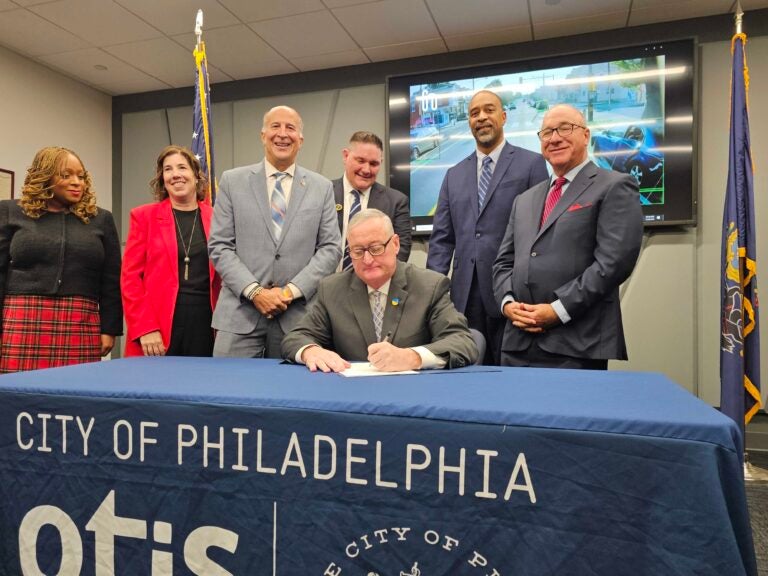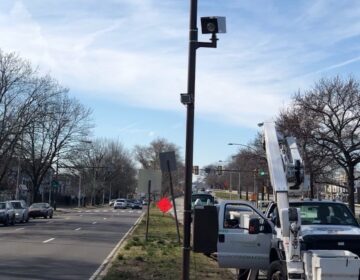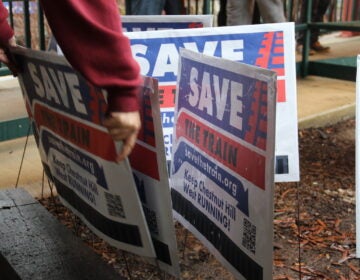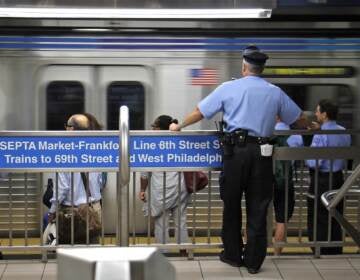Philadelphia to use AI-powered cameras on SEPTA to write parking tickets
Cameras will be mounted on SEPTA buses and trolleys to detect cars parked in bus lanes and bus stops to help keep them clear.

Mayor Kenney signs bill authorizing bus lane enforcement via septa bus video (Tom MacDonald)
From Philly and the Pa. suburbs to South Jersey and Delaware, what would you like WHYY News to cover? Let us know!
From April to June, SEPTA tested the use of artificial intelligence cameras to identify cars that block designated bus lanes or stops along Chestnut and Walnut streets. That initial trial detected about 4,000 cars blocking lanes in Center City, and 32,000 bus stop violations in West Philly and Upper Darby.
Thursday morning, Mayor Jim Kenney signed legislation that would expand the program from just a trial run. Once the cameras are installed, tickets will be issued to people who block bus stops or the red bus lanes in the extended Center City/University City area.
While AI will be used to identify violators, Christopher Puchalsky of the Philadelphia Office of Transportation, Infrastructure, and Sustainability says it will be a human being that determines if tickets will be handed out.
“It’s going to be a parking enforcement officer at the end of the day that signs off that this is an infraction,” Puchalsky said.
SEPTA GM Leslie Richards said the blockages slow down travel and cost the transit agency millions of dollars every year because of delays on routes.
Cars blocking bus stops creates big problems for people with disabilities.
Latoya Maddox said being in a wheelchair and having the bus access blocked makes traveling on SEPTA difficult, if not impossible.
“People with disabilities are put at a disadvantage, because we can’t hop off the curb, we have to be at the curb ramp, and if there’s cars at the curb ramp, we have to go around,” Maddox said.
The vehicle mounted cameras will show the blockage similar to speed cameras and red-light cameras already running in the city. A Philadelphia Parking Authority enforcement officer will be assigned to review the video and sign off on a ticket which will cost about $100.
Mayor Jim Kenney said it’s a sign of “selfishness and laziness” when drivers park illegally.
“As someone who spends a lot of time in the car, I will tell you one of the most annoying things about this city is people stopping their cars wherever they want to stop them in bus lanes, double parking. It just screws everything up,” Kenney said. He added that drivers deserve to be cited for parking illegally.
“If you start getting tickets in the mail for doing it, good for you, pay your tickets and wise up.”
Today, I signed Bill No. 230489 into law. This bill will allow SEPTA to use camera-based parking enforcement technology on buses to target illegally parked vehicles blocking transit stops and bus lanes to decrease traffic congestion and improve traffic safety. pic.twitter.com/xjPL6LqK3g
— Mayor Jim Kenney (@PhillyMayor) November 9, 2023
It could take a year for the system to be up and running. The city will issue a request for proposals, and then install and test the cameras before the first tickets will start being handed out. Once it’s up and running, the system will send out warnings for the first 30 days before actual tickets will be distributed.
Philadelphia Parking Authority head Richard Lazer said the speed cameras have been 90% effective in reducing speeders, and red light cameras are responsible for a 48% decrease in red-light running in city intersections where they are installed.
He expects the bus-based cameras to substantially reduce the number of people who park in the bus lanes and lessen “congestion and improve safety and allow people to travel the city safely without obstruction.”

Get daily updates from WHYY News!
WHYY is your source for fact-based, in-depth journalism and information. As a nonprofit organization, we rely on financial support from readers like you. Please give today.






